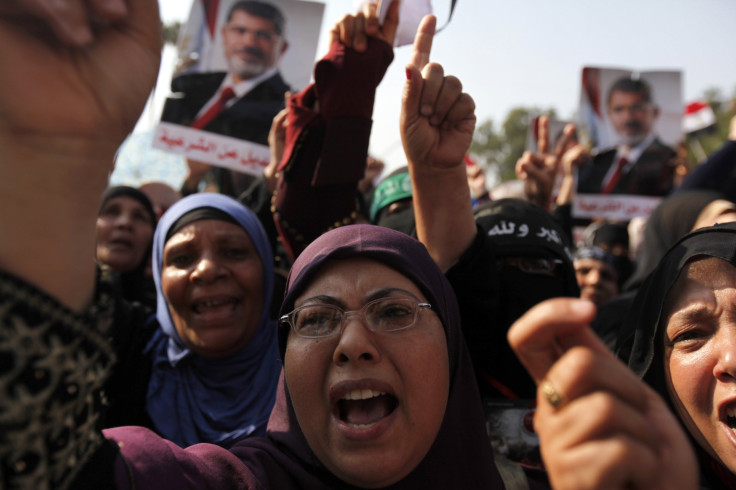How Mohammed Morsi's Ouster In Egypt May Help Radicalize Islamists

CAIRO -- Less than a week after the military-backed popular opposition movement ousted Islamist President Mohamed Morsi, the Egyptian military's standoff with his supporters took a violent turn on Monday, threatening to polarize the country even further and stall any political transition.
At least 51 protesters supporting Morsi's Muslim Brotherhood-backed government and three members of the security forces were killed and more than 200 wounded in the deadliest clashes since the latest wave of protests erupted on June 30.
Morsi backers accused Egyptian soldiers and police of being responsible for the violence, while the military said in a statement that an "armed terrorist group" attacked the security forces early on Monday. Adly Mansour, the head of the Supreme Constitutional Court and interim president since the military appointed him last Thursday, ordered an investigation into the deaths.
In response, the Muslim Brotherhood’s political arm, the Freedom and Justice Party, called for an “uprising” against those “trying to steal our revolution with tanks.” The ultra-conservative Salafist Nour Party, which has previously supported the military-backed transition, withdrew from the transitional coalition.
Since announcing establishment of a transitional government last Wednesday, the military has moved systematically to arrest leaders of the Muslim Brotherhood and to close Islamist TV stations. That has further galvanized Islamist supporters. So did a humiliating video showing the arrest of Khairat Al Shater, an influential Muslim Brotherhood power broker and businessman, which quickly went viral on social media, symbolic of the Islamists' swift removal from power.
The escalating violence is only hardening the resolve of Morsi supporters, the members of the Muslim Brotherhood and radical Islamists. “They are the biggest party in Egypt; they are going to win,” said Fatima Darrwish, a Cairo homemaker who voted for Morsi a year ago and continues to support him.
“After being so defiant, it’s very difficult for them [the Islamists] to back down after emphasizing the legitimacy issue so much,” said Shadi Hamid, director of research for the Brookings Center in Doha, Qatar. “The new government will have to offer major concessions.”
While their support has eroded dramatically over the past year, the Muslim Brotherhood and ousted president Morsi still have a loyal following.
Yet, “there are major mistakes that the Muslim Brotherhood has made in its year in power, which have cost it a lot of its political capital,” said Tarek Osman, author of "Egypt on the Brink: from Nasser to Mubarak." “The current developments -- under whatever scenario that would materialize in Egypt in the coming months -- would significantly weaken the Brotherhood’s presence in Egyptian politics.”
Analysts also say the Brotherhood's losses and its forcible ouster from power are empowering the Salafist movement and mobilizing the radical Islamists.
“Some Egyptians are going to look at them and say ‘elections don’t work,’” Hamid said. “There are those who are considering withdrawing from the political process and resorting to violence. The radicalizing is already in motion.”
On Monday, the influential Sunni cleric Sheikh Yusuf al-Qaradawi issued a fatwa, or ruling from a recognized religious authority, condemning the army’s removal of Morsi as “un-Islamic” and urging all Egyptians “to protect the gains of the revolution.”
Just a few days after Morsi was forced out, a new radical group called Ansar al-Shariah, or "Partisans of Islamic Law," has emerged in Egypt. The group, which has the same name as extremist Islamic factions in other Arab countries, pledges to acquire arms and train Muslims to “deter the attackers, preserve the religion and empower the Shariah of the Lord,” the group wrote in a statement posted on an online forum for armed groups in the Sinai.
The strategic Sinai peninsula, where several extremist groups and rogue militias are based, saw a spike in violence since Morsi's ouster. Militants killed a Coptic Chirstian priest there Saturday; on the same day, there was an explosion at a gas pipeline connecting Egypt to Jordan.
At pro-Morsi rallies across Egypt and on social media platforms, there has been an increase in calls to violence and suicide bombings from extremists. “It’s very clear that a dangerous narrative is emerging,” Hamid said.
Amid the political standoff, both the pro-Morsi Islamists and the secular opposition accuse the U.S. of backing their opponents, leaving the Obama administration in a tricky situation.
“The problem with the Obama administration is that they don’t have a clear policy (in Egypt) so they confuse their audiences, but an Egypt strategy is absolutely essential in the upcoming phase,” Hamid said. “It’s very important to reincorporate the Muslim Brotherhood into the political process.”
© Copyright IBTimes 2024. All rights reserved.




















